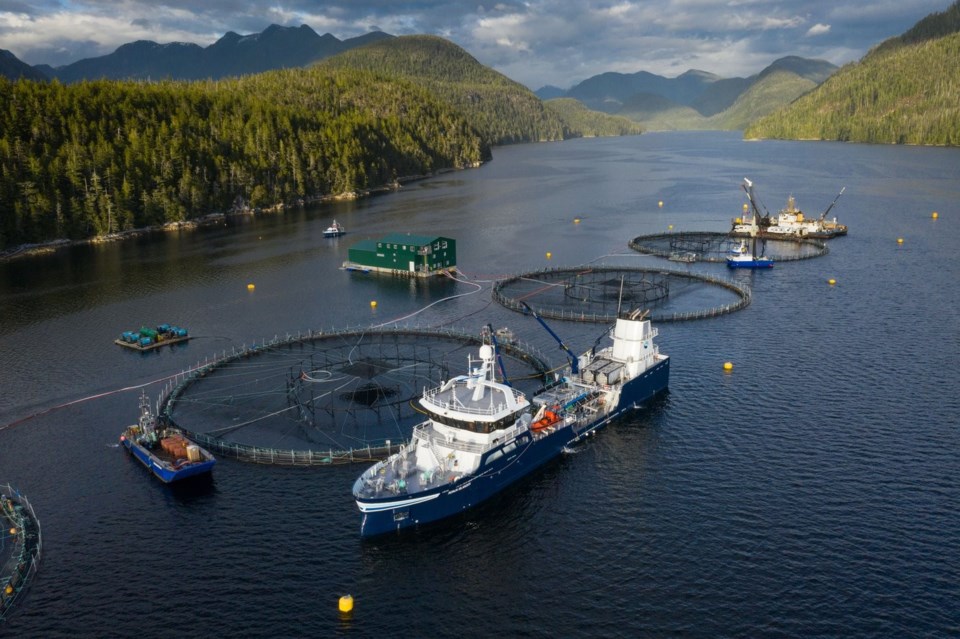It didn’t take long for fisheries experts from British Columbia to slam the Canadian government for its latest announcement on the impacts of salmon farms on Fraser River wild salmon stocks.
A news release sent out on Monday said Fisheries and Oceans Canada had finished nine scientific risk assessments to determine the impact of interactions between wild Pacific salmon and pathogens from the salmon farms in the Discovery Islands. There are currently 18 in those waters.
Federal officials said the results of these assessments concluded the transfer of pathogens pose a minimal risk to abundance and diversity of migrating Fraser River sockeye salmon.
“Although they say there’s minimal risk, there’s a lot of uncertainties in those reports,” said Stan Proboszcz, a Vancouver-based science advisor for the Watershed Watch Salmon Society, a salmon advocacy group.
“It’s very disappointing from a scientific perspective because I feel they are misleading Canadians.”
A total of 10 assessments were to be done after the country established the Cohen Commission of Inquiry into the Decline of Sockeye Salmon in the Fraser River in 2009.
The purpose of this inquiry, which wrapped up in 2012, was to discover the reasons for the decline of sockeye salmon stocks and to provide recommendations.
A total of 75 recommendations were issued in the inquiry’s final report.
One of the recommendations read as follows:
“On September 30, 2020, the Minister of Fisheries and Oceans should prohibit net-pen salmon farming in the Discovery Islands (fish health sub-zone 3-2) unless he or she is satisfied that such farms pose at most a minimal risk of serious harm to the health of migrating Fraser River sockeye salmon. The Minister’s decision should summarize the information relied on and include detailed reasons. The decision should be published on the Department of Fisheries and Oceans’ website.”
Proboszcz is especially disappointed federal officials did not conduct all of the assessments the ministry said it would undertake.
He said officials had long maintained they would evaluate risks of 10 pathogens, following the release of the commission’s final report, which was titled The Uncertain Future of Fraser River Sockeye.
Proboszcz said an assessment on sea lice, arguably the most dangerous pathogen, was never done. Proboszcz said a final report on all the assessments, which had been previously promised, was never done either.
“It seems they ran out of time and they skipped some steps,” Proboszcz said of federal officials.
Proboszcz was a steering committee member for five of the nine assessments the government did perform.
Plus, Proboszcz, who has been with the society for 14 years, does not trust the federal findings.
“I don’t have a lot of confidence in their conclusions,” he said. “They failed to convince me these farms are at minimal risk.”
Proboszcz was hoping all the Discovery Islands salmon farms would be removed by the end of this month. The federal government has until the end of this December to decide whether it will renew the aquaculture licenses.
What further infuriated Proboszca is that it was only in Monday’s announcement that Canadian officials revealed they will commence consultations with seven First Nations regarding the salmon farm sites.
Those First Nations are Holmalco, Klahoose, Komoks, Kwiakah, Tla’amin, We Wai Kai and Wei Wai Kum.
“They just started those (consultations), which is kind of late,” Proboszcz said. “They had eight years from the time this inquiry started.”
Federal officials said these consultations will assist them in determining whether to keep the current salmon farms operational beyond the end of this year.
Like Proboszcz, Bob Chamberlin, the chair of the First Nation Wild Salmon Alliance, was upset with Monday’s announcement.
“It was a shameful disappointment,” he said. “Ottawa is doing what they want for a select few people and disregarding the voices of the majority of British Columbians.”
Chamberlin, the former chief for Kwikwasut'inuxw Haxwa'mis First Nation, believes the consultations with First Nations that federal officials have mentioned will not be productive.
“I don’t have any faith that will be meaningful in any way, shape or form,” he said.
Chamberlin said he anticipates it would be a lengthy process to consult with seven First Nations. He believes all of the First Nations would want their own separate meetings with federal officials as they would be dealing with their own specific needs.
Chamberlin said they would also be discussing nine different reports concerning 18 fish farm licenses.
“It’s painful and can be very long drawn out,” he said of the process.
Chamberlin doubts federal officials will listen to the concerns of officials from various First Nations.
“What you have is an ambush,” he said.



.png;w=120;h=80;mode=crop)
